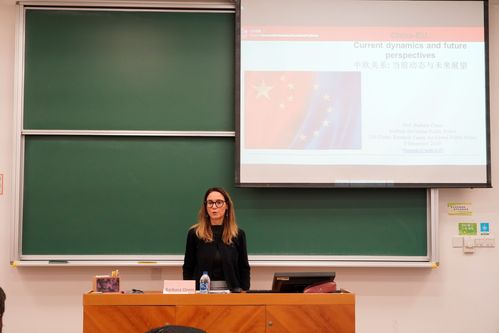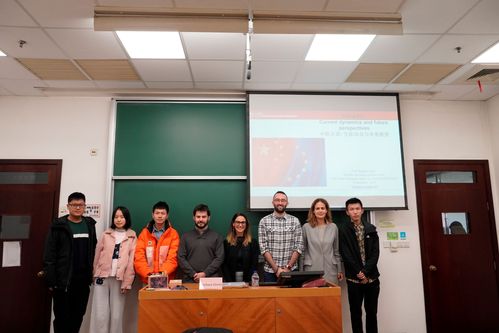
On December 9th, the 26th Fudan-LSE Lecture series was held in Room 302 of the West Sub-building of Guanghua Towers at Fudan University. The lecture was organized by the Institute for Global Public Policy (IGPP) of Fudan University and the LSE-Fudan Global Public Policy Hub. Dr. Andrea Ghiselli served as the moderator.
Barbara Onnis, Associate Professor at the University of Carrillo, Italy, was invited to give a lecture on the title “China-EU Relations: Current Dynamics and Future Perspectives”. Professor Onnis is affiliated with the Institute of Political and Social Sciences at University of Cagliari. She is also a visiting scholar at IGPP currently. Her research focuses on Sino-European relations and foreign policy of China.
Professor Onnis started with a brief overview of China-EU relations since 1975: China established a formal diplomatic relation with the European Economic Community (EEC) in 1975. Both parts signed the first trade agreement to grant each other the most-favoured-nation treatment in 1978. The China-EU Joint Economic and Trade Committee was also created in the same year. In 1985, the EEC and China further signed the Agreement on Trade and Economic Cooperation in Brussels. The relations faced a severe challenge in 1989, when EEC imposed sanctions on China. But the following decades turned out to be a golden age for both sides to ease the tension and gradually move towards a comprehensive strategic partnership. Moreover, the Euro Crisis and the Global Financial Crisis further brought China and Europe into a new stage of economic cooperation. Moving forward, China-EU relations continue to face many opportunities and challenges in both political and economic domains.

Professor Onnis went on to discuss the differences that potentially divide two sides. China and the EU have different political systems and values. Their geopolitical interests are also divergent – China pays more attention to the Asia-Pacific region whereas the EU is more concerned with the northern part of Eastern Europe and the southern coast of the Mediterranean. Lastly, China and the EU have different views on the future world order. Europe is the founder and promoter of the current world order, while China has yet to play a significant role in it.
Professor Onnis also provided her explanation for why China and the EU can build a comprehensive strategic partnership despite those differences. According to her, the primary reason is economic benefits of bilateral trade to both sides. What is also critical is the consensus among officials on both sides to curb the unilateralism of the US, which overshadows the role of EU. In the meantime, Professor Onnis did not shy away the issues that hinder the deepening of China-EU relations, such as arms embargo, the lack of transparency in China’s investment towards Europe under the framework of the Belt and Road Initiative (BRI), and the fact that the EU members do have their own foreign policy stances. The problem is particularly pronounced in the case of the BRI when Chinese investment companies in Central and Eastern Europe failed to comply with the EU regulations on large-scale infrastructure construction.
Professor Onnis closed the talk with her view on the future development of China-EU relations in the current international context. Despite some challenges, she remained confidence in good prospects of China-EU relations and believed that an equal and mutually beneficial partnership between the two contribute to a greater level of international collaboration to cope with changing global circumstances.
At the end of the lecture, Professor Onnis interacted with students and faculty members, engaging in a series of discussions on specific issues related to this topic.





